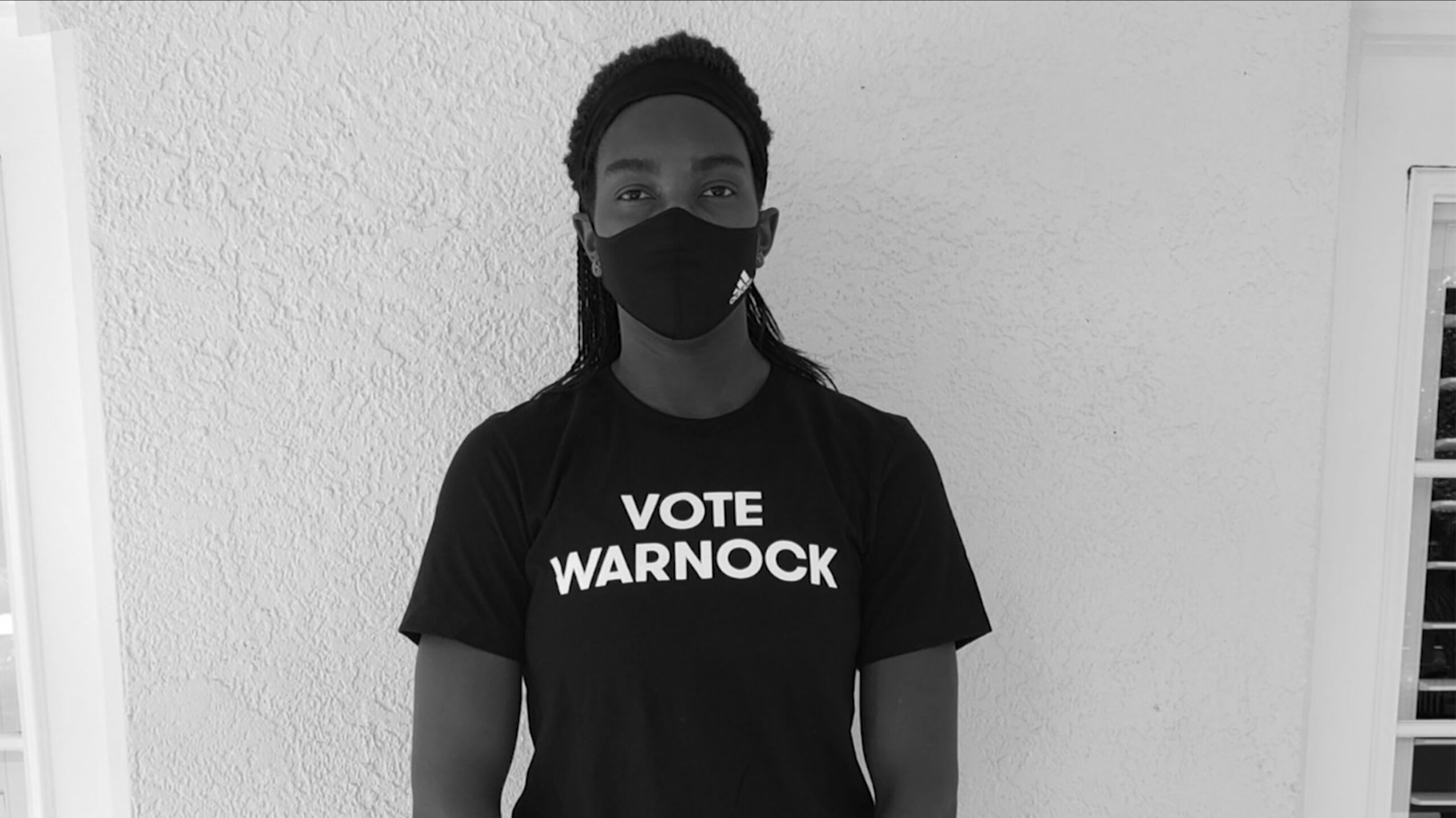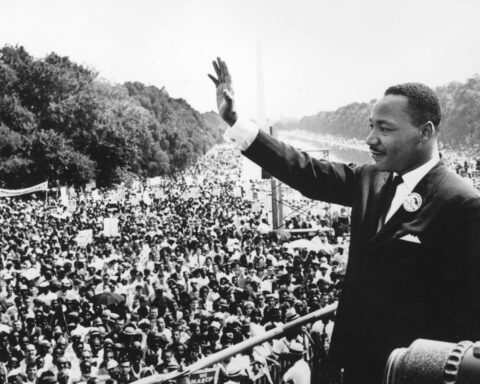There’s a distance of just over two miles between the Lincoln Memorial and the US Capitol. It was in 1963, on the Lincoln Memorial’s steps, that The Rev. Martin Luther King Jr. told the 250,000 people gathered there: “I have a dream that one day […] the rough places will be made plain and the crooked places will be made straight […] and all flesh shall see it together.”
Fast forward over a half a century and events at the US Capitol suggest America is still struggling to realize King’s dream as outgoing Sen. Kelly Loeffler discovered to her cost.
Loeffler is the co-owner of a women’s basketball team in the WNBA, The Atlanta Dream, named with a nod to King Jr., the nation’s most iconic and revered civil rights activist and his hometown.
But in one of 2020’s surprise endings, Loeffler’s own political dreams were sensationally scuppered by the players of her own sports team, a group of her employees who rose up against her to secure, as MLK would have put it, “the unalienable rights of life, liberty and the pursuit of happiness.”
It’s one of the most extraordinary stories of what has been a seismic election season; the triumph of a group of athletes who set out with the intention of doing the right thing, but who, in the end, might also have helped change the course of history.
Elizabeth Williams says she never considered herself to be political; the British-born American basketball player was one of the top picks in the 2015 draft and she’s played for the Atlanta Dream since 2016. But for the 27-year-old Williams and her teammates, everything changed in the summer of 2020.
“After the brutal killings of George Floyd, Ahmaud Arbery and Breonna Taylor,” Williams told CNN. “We saw a large shift in the fight for social justice and the Black Lives Matter movement. We wanted to feel like our voices were going to be heard.”
Professional athletes understand all too well the risks associated with making a stand. Colin Kaepernick was frozen out of the NFL after taking a knee during the national anthem in 2016, while in the following year, catcher Bruce Maxwell received numerous death threats for doing the same thing ahead of a Major League Baseball game. But few players, if any, have ever stood in direct opposition to the personal interests and ambitions of their employer.
The WNBA is well known for its support of social justice causes. Collectively, the players chose to dedicate last season to the memory of Breonna Taylor — a Black woman who was shot and killed by police in her Kentucky apartment — and they established their own social justice council.
“We made sure to support the ‘Say Her Name’ movement. You know, have Black Lives Matter on the court,” Williams said. But then what she describes as “a unique situation” almost stopped them in their tracks.
The co-owner of their team, Loeffler, “openly denounced Black Lives Matter in a letter to our league’s commissioner, essentially denouncing Black Lives Matter and the movement and saying that we need to keep politics out of sports.”
Loeffler described BLM as a “very divisive organization” which promotes “violence and destruction across the country.”
The players knew what Loeffler was doing. As one of Georgia’s two Republican senators, she was campaigning ahead of the 2020 election and trying to head off the challenge of another Republican, Doug Collins.
That meant tacking to the extreme right of the political spectrum, pledging loyalty to US President Donald Trump and throwing out red meat to the party’s base.
CNN has reached out to Loeffler’s team for comment but is yet to receive a response.
Following the decision not to charge any of the police officers involved in Breonna Taylor’s death, NBA star LeBron James tweeted, “The most DISRESPECTED person on earth is THE BLACK WOMAN!”
Asked about her own experience of being a Black woman in America, Williams told CNN that “in addition to sometimes feeling a bit of fear, we often feel unheard. And specifically, as female athletes, we often feel that even more. So, we always find ways to try to speak up for people who often aren’t heard.”
In response to the stance of their team owner, Williams said the players were frustrated, disappointed and confused. “There were definitely a lot of emotions,” she explained.
The league told CNN that the demographic composition of the WNBA is 80% persons of color, some of whom, Williams said, have “lost family members to gun violence, have felt a lot of this in a very personal way.”
Some were furious. Before the decision not to charge officers involved in Taylor’s shooting was made, the players’ union, the WNBPA, tweeted “E-N-O-U-G-H! O-U-T!” over Loeffler’s opposition to the WNBA’s support for the BLM message while Dream guard Renee Montgomery posted that she was “pretty sad to see that my team ownership is not supportive of the movement & all that it stands for. I was already sitting out this season & this is an example of why.” Montgomery was on a sabbatical to focus on social justice reform.
There were calls for Loeffler to stand down and a team statement on July 10, signed by all the players, read: “We are the women of the Atlanta Dream. We are women who support a movement. We are strong and we are fearless. We offer a voice to the voiceless. Our team is united in the Movement for Black Lives. It is not extreme to demand change after centuries of inequality. This is not a political statement. This is a statement of humanity. Black Lives Matter.”
Throughout the course of the interview with Williams, it became apparent that she hadn’t once mentioned Loeffler by name. “People in politics talked about the power of saying someone’s name,” she said. “And so you can also do the opposite by not saying someone’s name.”
The name they chose to say instead was Reverend Raphael Warnock, a Democratic challenger to Loeffler who was a long shot in the senate race, polling in single digits among registered voters in July, according to Monmouth University Poll.
But at the start of August, without saying another word to criticize their owner Loeffler, Dream players began publicly supporting her political rival.
“We wanted to react in a way that was still so classy and still promoted what we want to promote,” said Williams. It was a plan of action that had the support of players across the league and soon many of them were wearing t-shirts bearing the simple message “Vote Warnock.”
Posing in the t-shirt that same day, Williams tweeted, “We are WNBA players, but like the late, great John Lewis said, we are also ordinary people with extraordinary vision.”
Suddenly, Warnock’s campaign was receiving national attention, players were endorsing him in media interviews and donations were rolling in from well beyond the Georgia borders. Warnock’s campaign reportedly said that within just two days of the players getting involved, $200,000 was pledged and the volume of individual donors soared.
The surge of support enabled him to invest in more campaign advertisements and helped increase his campaign’s momentum.
Speaking about the players’ support, Warnock told USA Today: “I think it was helpful. It was one of the many turning points in the campaign. It gave people a chance to look a little closer and say, ‘Who is this Warnock guy and what is he about?'”
From meager polling numbers of 9% in July, Warnock had climbed to 21% in September, according to the Monmouth University Poll, and two months later, he finished first in the election with 32.9%.
Because state rules dictated that the winner would have needed to clear 50%, Warnock then lined up in a head-to-head runoff against Loeffler, who finished second in the November race with 25.9% of the vote. On January 5, in a one-on-one election, Warnock became Georgia’s first-ever Black US senator and also the first Black Democratic US senator from a southern state.
By this point, though, his victory was even more significant. A quirk of fate meant that the two runoff elections in Georgia could hand the Democrats control of the Senate for the first time in six years. Warnock’s win, paired with Jon Ossoff’s success in the other race, has made President-elect Joe Biden’s task of governing considerably easier than it might otherwise have been. Just as Warnock’s election was historically significant, so, too, was Ossoff’s; he’s the first Jewish person that Georgia has sent to the Senate.
As news of Warnock’s triumph became clear, text group chats among Atlanta players and their counterparts across the league began lighting up. Williams says she found it hard to sleep. “Wow, we really did this! We helped flip the Senate,” she recalled. “A lot of the messages were just being thankful for being a part of this group of really, really impactful and incredible women.
“You feel all the emotions; the pride, the joy and then the optimism. A lot of what we’ve seen politically has been surrounded in division and hate, and I think in this moment in particular, it was a moment to be hopeful.”
The joy was short-lived, though. Within hours of Warnock’s victory being confirmed, an angry mob had stormed the Capitol in Washington DC. An insurrection inspired by President Trump, left five people dead — including a Capitol policeman. A despicable “Camp Auschwitz” sweatshirt was seen in the Capitol and the divisive Confederate flag (a relic of the Civil War and a modern-day symbol of racism) was paraded there for the first time in the history of the United States.
Williams, who’s now playing basketball in Turkey, says she was disappointed and frustrated, though not necessarily surprised, and felt helpless and embarrassed by the scenes playing out on TV.
“Often in the history of America, we’re in this juxtaposition of something really good happening and something bad. You know, like the fact that the [Georgia Senate runoff] election was the same day that we got the news that the officer that shot Jacob Blake wouldn’t be charged.”
Despite all the progress that has been made, Williams says that “we do always have to be aware and have to be accountable for a grave history of White supremacy and fear.”
Williams says the experience of the last year has changed her mindset forever. “Yeah, I guess I’m a little more political now,” she reflected. “I think I always paid attention to these things, but I always felt like, ‘Well, you know, somebody else will do it.’ But I’ve grown into stepping out and trying to be a leader in these moments.”
As MLK himself said: “A man dies when he refuses to stand up for that which is right. A man dies when he refuses to stand up for justice. A man dies when he refuses to take a stand for that which is true.”




